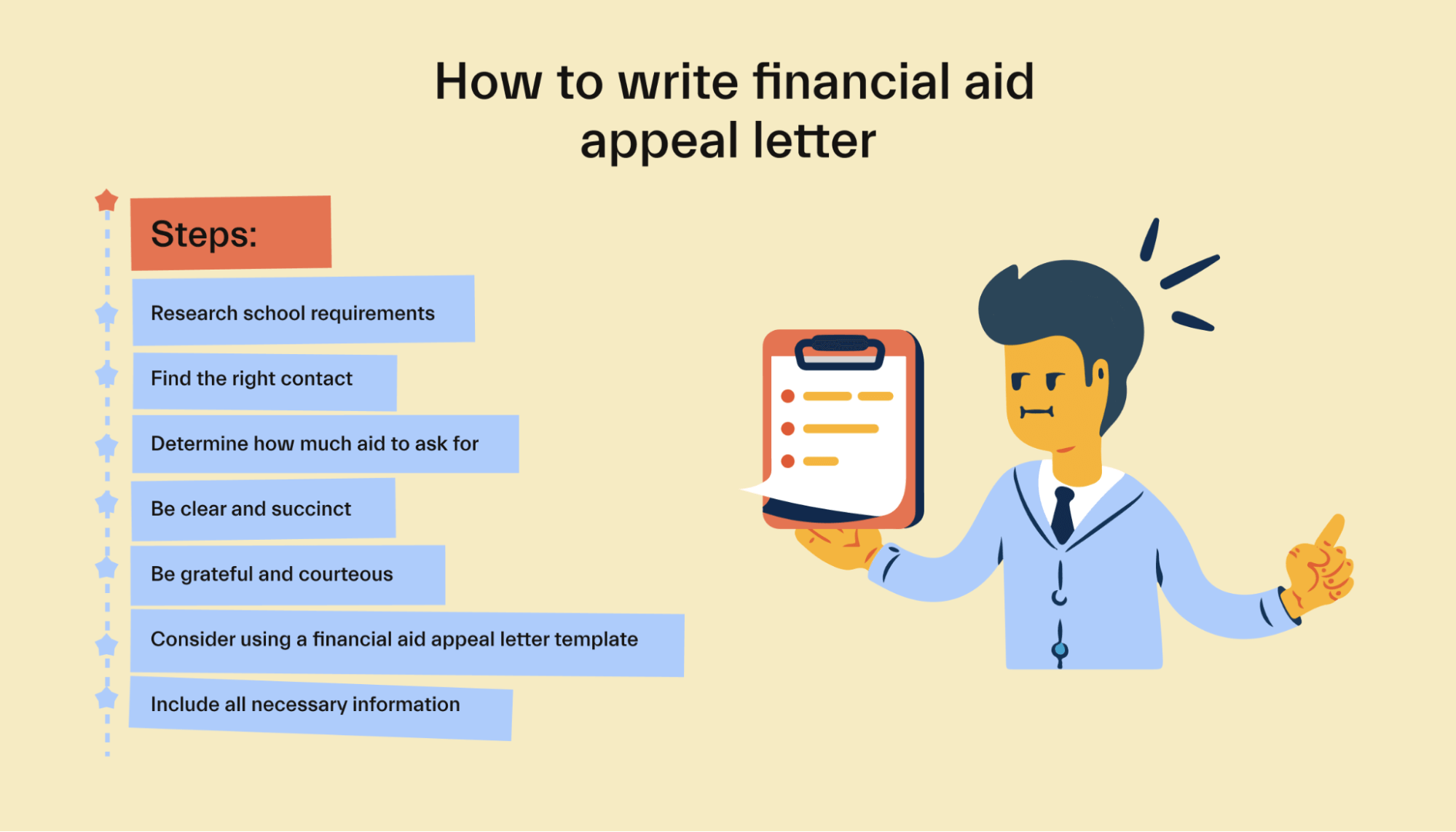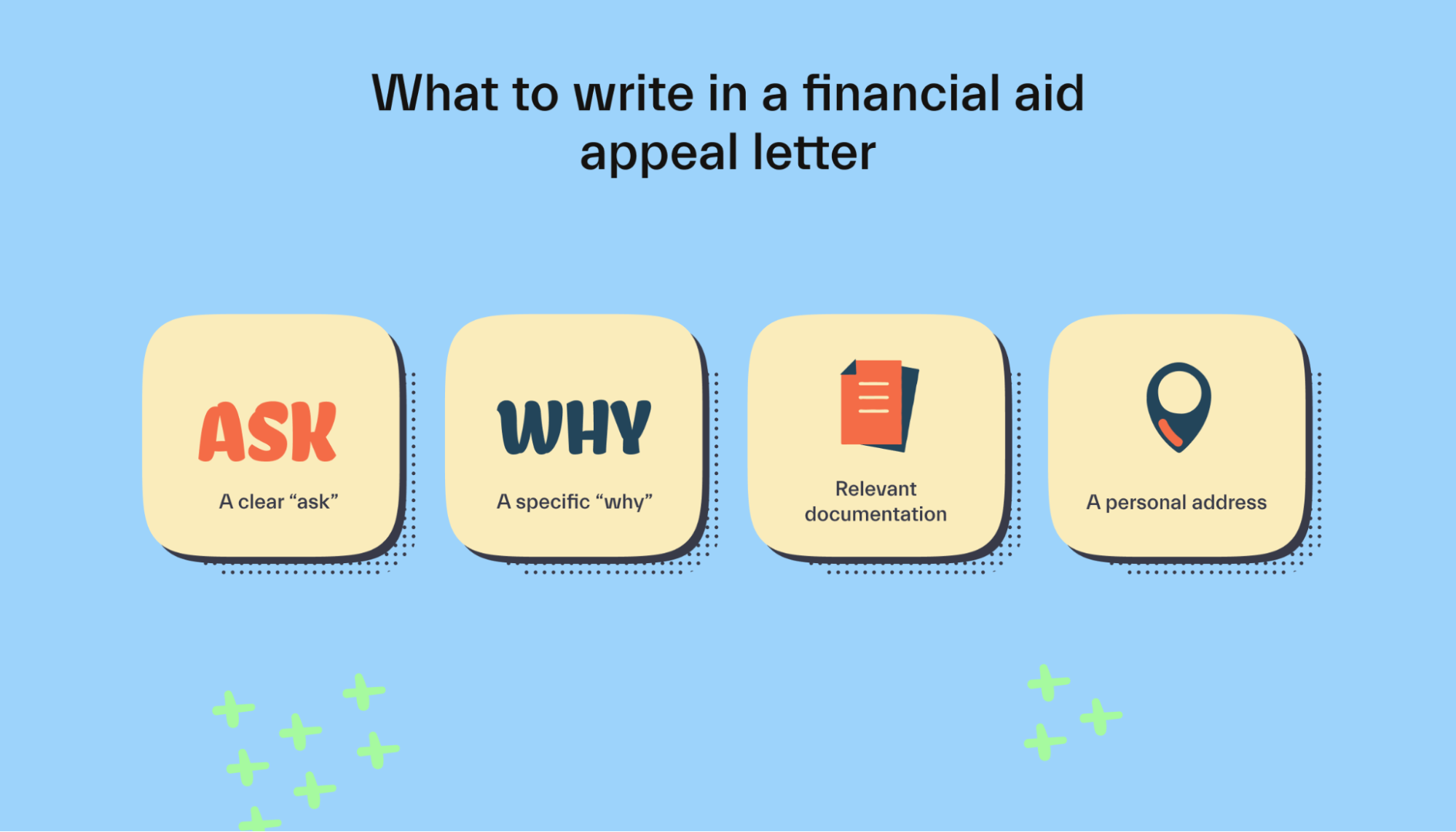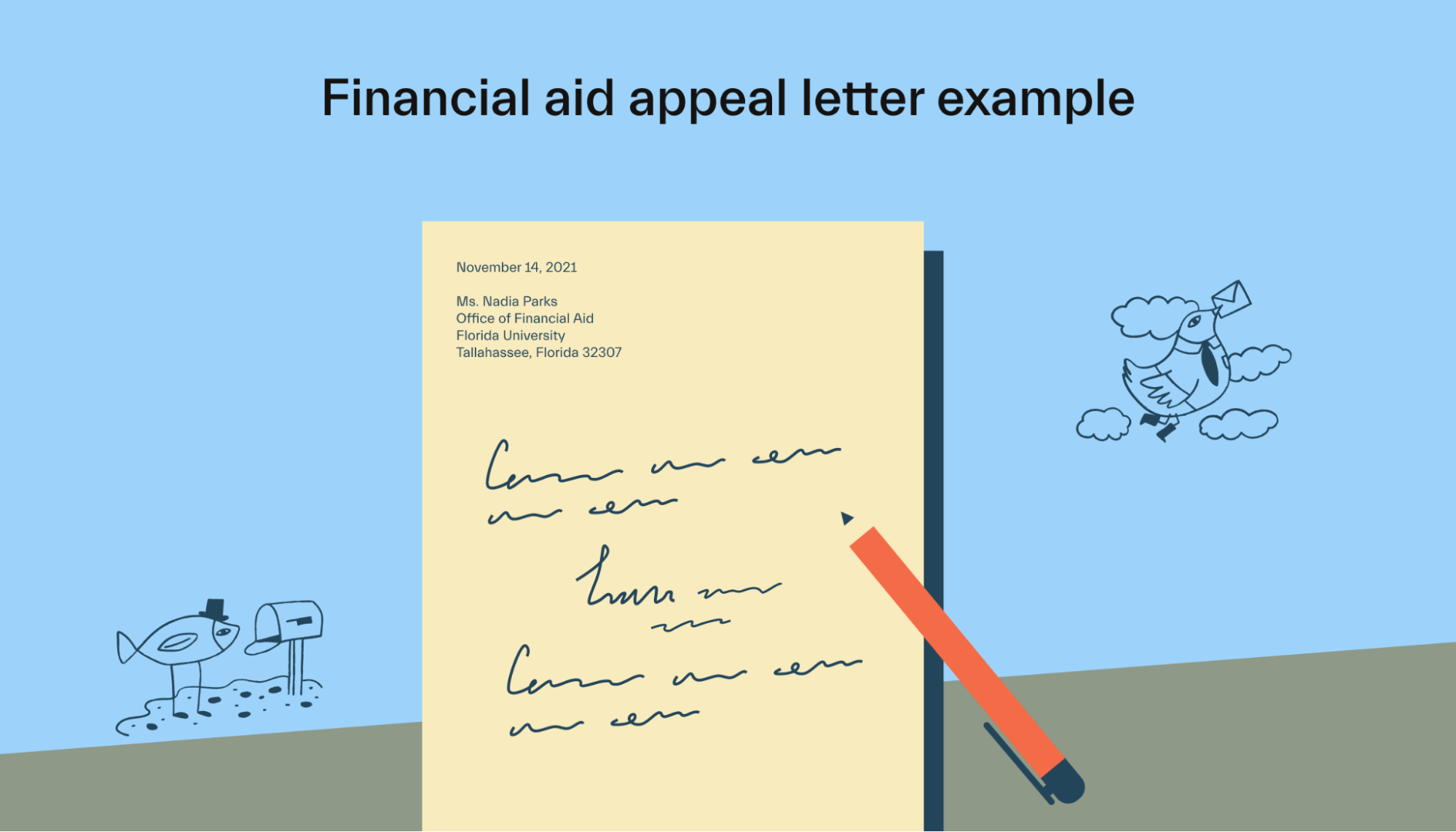Financial aid •
December 20, 2021
How to write a financial aid appeal letter
Do you think your school is overcharging you, or you're missing out on financial aid? Check out this guide from Mos to find out how you can request more aid.

We don’t need to tell you that college is more expensive than ever.
Fortunately, there are many college financial aid programs available. In fact, in the 2019–2020 school year, 87% of applicants received some sort of financial assistance. However, it’s up to students to make sure they’re getting all the financial aid available to them.
Believe it or not, an estimated $3.75 billion in Pell Grants alone went unclaimed for the 2021 high school graduating class.
So, what happens if you don’t get all of the financial aid you were hoping for? What if you were only offered federal student loans when you were expecting grants?
The good news is you may be able to negotiate with your financial aid office and/or appeal the decision by submitting a formal financial aid appeal letter.
In this guide, we’ll explain how to communicate with your school, the reasons why you may want to write a negotiation letter and walk you through sample letters.
What is a financial aid appeal letter?
After you file your Free Application for Federal Student Aid (FAFSA), you’ll receive a financial aid award letter from the college or university.
This aid offer letter you’ve gotten based on your FAFSA will cover the details of your scholarships, federal student loans, and need-based aid like grants you'll be able to use to help you cover the cost of attendance at your chosen school.
If your situation has changed since you filed your financial aid application or if you didn’t receive the aid you were expecting, you’ll still have the option to appeal.
Appealing for financial aid typically involves writing the school a letter requesting more funds. In your request, you must describe the what and the why—meaning what type of aid you are asking for and why you believe you deserve that aid.
The amount of financial aid you’re ultimately able to receive is based on a combination of factors, including but not limited to, your income and your academic achievements.
Can you lose your financial aid eligibility?
You may find yourself in a position where you've benefited from federal student aid one year but haven’t been able to secure it for a second year. Your loss in eligibility could be for a number of reasons, including:
Poor academic performance or failure to make satisfactory academic progress (SAP) toward your degree
Reducing your hours so that you go from being a full-time college student to a part-time student
Your US citizenship gets revoked
You go to jail
There are a couple of other situations where you may become ineligible for student aid, but that depends on whether you're talking about grants, scholarships, or loans.
When in doubt, you should check for guidance on the US Department of Education's Federal Student Aid website.

Reasons to write a financial aid appeal letter
1. Your total costs are not covered
Let’s say you’ve gotten your financial award letter, and the amount you’re offered is way less than you were expecting it to be, especially if your expected family contribution (EFC) and total free aid won't cover your total costs.
2. Your aid offer is missing programs
Your school might not include all the grants and scholarships you qualified for! Check your college financial aid resources webpage and see if you have received all the federal and state grants and institutional scholarships you applied for. If not, you should write a letter explaining that you’re eligible for these awards and would like them to be added to your aid list.
3. Your FAFSA no longer reflects your situation
If your circumstances have been impacted in certain ways, you’ll have a strong chance of getting your appeal approved. Here are some common situations in which you may wish to write a financial aid appeal letter seeking additional aid:
Experiencing loss of income
Receiving one-time income in 2021 (the tax year you used on the 2023-2024 FAFSA)
Entering Incorrect information on your FAFSA
Experiencing unexpected major medical or dental expenses
Experiencing the death of a family member (mainly if you covered funeral expenses)
Divorce (happening after submitting the FAFSA)
Natural disaster
How to write a financial aid appeal letter
Writing a financial aid letter can feel intimidating, but it really just requires you to know the basics ahead of time. For the best chance of chalking up a successful appeal on your financial aid decision, follow the steps below.

1. Research school requirements
Each college and university will have slightly different expectations and requirements when it comes to appealing financial aid.
Some colleges or universities may require a written letter, while others will have a specific form to fill out. Likewise, due dates for appealing financial aid decisions vary by school.
To learn more, you can try researching online by searching for “[your school] + financial aid programs, or appeal process” and similar search terms.
2. Find the right contact
For the best results, it’s helpful to address your letter to a specific individual at your school’s financial aid department. Most schools have a directory of staff that students can access. While you can simply address the letter to the “financial aid office,” you may find more success in writing to a specific contact.
3. Determine how much aid to ask for
Before negotiating, do the math to figure out how much aid you actually need to attend the school, and be prepared to explain this amount. You’ll want to ask for a specific amount of money.
4. Be clear and succinct
Your school’s financial aid office is busy. For best results, keep your writing clear and concise. Generally speaking, a financial aid appeal letter should be no more than 1 page in length.
5. Be grateful and courteous
It’s important to write respectfully and in the right tone. Begin the letter with gratitude for the financial aid you’ve already been offered, and close it with a genuine thank you for the consideration to alter your aid amount.
6. Consider using a financial aid appeal letter template
If your school doesn’t have a specific form and requests a written letter, it can be helpful to use a template. SwiftStudent is a free resource that offers templates and other useful resources to help you write your appeal letter.
7. Include all necessary information
You don’t need to write your life story—but you’ll need to cover all the relevant information as to why you are appealing the decision. This includes details of special circumstances, the exact amount you are asking for, and appropriate documentation.
A good financial aid appeal letter will include all the necessary information without excessive “fluff.” It should be concise, genuine, and respectful.
What should I write in my financial aid appeal letter?
Here are the specific points that should be included in your letter. Be sure to check your specific school’s requirements to confirm what should be included.

A clear “ask”
You’ll need to directly ask the financial aid office to reconsider your aid amount. You should also include a specific amount of money that you are asking for and why that amount would enable you to attend the school.
A specific “why”
Attach any documents that demonstrate your financial challenges. This could be a large medical bill, a death certificate of someone in the family (who was helping with your costs), or a notice of layoff/unemployment application to prove a change in income.
You can refer to these in your writing and then attach the actual documents to your letter.
Relevant documentation
Attach any documents that demonstrate your financial challenges. This could be a large medical bill, a death certificate of someone in the family (who was helping with your costs), or a notice of layoff/unemployment application to prove a change in income.
You can refer to these in your writing and then attach the actual documents to your letter.
When should I reach out to my financial aid office?
After receiving your award letter, you should write the letter to your financial aid office as soon as possible.
Your school may have deadlines for processing requests—most awards are offered on a first-come-first-serve basis! When it comes to college need-based financial aid. Many schools have their own financial assistance programs available to students, but unlike federal funds, this money is limited.
For this reason, applying for financial aid and appealing aid decisions ASAP is helpful if you don’t receive all the aid you need.
Financial aid appeal sample letter
If you've been hunting over the web looking for an aid appeal letter sample, look no further.
As with any letter, make sure to personalize the following templates with your specific information and tailor them to your unique circumstances and goals. Follow your school's guidelines for negotiation and communicate professionally and respectfully.

Here's a sample template if you need to negotiate for more money or lower costs:
Dear Office of Financial Aid (Or add the specific individual’s name)
I hope this letter finds you well. I am writing to express my enthusiasm for attending [Your School] and to discuss the possibility of securing additional institutional scholarships or lowering my tuition costs.
[Share your excitement about attending the school and then express concern about the amount you have left to cover]
While I am thrilled about the prospect of becoming a part of the [Your School] community, I am also faced with the financial responsibility of making this dream a reality. I am aware of the excellent scholarship opportunities and aid programs available at [Your School], and I believe that with your support, I can achieve my academic and career aspirations.
Part of my financial success after college will depend on how I manage my college costs over the coming years. It’s with that in mind that I kindly request the opportunity to discuss how we can work together to make my education more affordable.
[Briefly mention any academic and extracurricular accomplishments you have]
I am open to exploring various options, such as institutional scholarships, grants, work-study programs, or tuition reduction, to ensure that attending [Your School] is feasible for me.
Thank you for your time and consideration. I look forward to your response and the possibility of receiving further support that will enable me to join the vibrant [Your School] community.
Sincerely,
[Your Name]
[phone number]
[Student email address]
Here's a sample template if you need to appeal based on special circumstances:
Dear Office of Financial Aid (or add the specific individual’s name)
I’m [Student first and last name], an incoming Junior at [University or College name]. I’m very much looking forward to attending school this year. I want to thank you for the financial aid offer extended to me. I’m very grateful!
Unfortunately, my family has experienced a change in income that affected my ability to pay for school. My mother was laid off in 2022, and she’s been unable to find another position yet. As such, the household income reported on my FAFSA is now incorrect, and my family will be unable to help me cover my educational expenses. My family’s expected household income has dropped from $90,000, as we reported on my FAFSA, to an estimated $45,000, affecting their ability to provide financial support for my education.
I truly hope that I can still attend [University or College name] this fall, but my financial situation has changed, and my ability to attend is now in jeopardy.
I’m asking for a review of my financial aid award, with consideration of my family’s new financial circumstances. I’m respectfully requesting additional financial aid in the amount of $5,000 to help me pursue my education. Your help is greatly appreciated, and I thank you for taking the time to review my financial aid award.
Attached, please find confirmation of my mother’s termination and the requested student financial aid appeal form from your office. Please email or call me if any additional information or documentation is needed.
Sincerely,
Samantha Hopkins
[phone number]
[Student email address]
What happens after you send your appeal letter
When you submit your appeal letter, a financial aid officer at your school will review it and either approve or deny the appeal.
If they approve your appeal, you’ll receive a new financial aid award letter detailing the new amount of financial aid you’ll receive for the upcoming academic year.
If they deny your first request, you should review their response and see if it’s worth following up with another letter. Follow-ups are usually effective, and financial aid offices appreciate persistence and polite communication, so they end up giving more money.
Again, this isn’t a guarantee. But you won’t know if you don’t try.
That makes nailing the letters all the more important. If you’ve got a compelling reason—like the ones above—your best shot is to follow the format we talked about.
How long does it take for the school to make a decision?
The process can take two weeks or longer—but it’s important to remember that it really depends on the school. Your school’s financial aid department should be able to tell you how long the process typically takes.
While waiting for the decision, the best thing you can do is explore other ways to help pay for college expenses, including niche scholarships. Mos can help you navigate the scholarship process to help you get every dollar possible to fund your education.
Conclusion
Submitting a financial aid appeal letter is well worth doing if you find that your financial aid award isn’t what you were hoping for.
The process can take as little as an hour and can really pay off if your appeal is granted.
If you want help navigating financial aid, scholarship processes, and writing letters, Mos is a great place to start. If you want to maximize your financial aid dollars, a Mos advisor might be your new BFF. Mos members can get personalized financial aid advice, essay editing, tuition negotiation, and much more. Find the best plan for you to get started.
Let's get
your money
- Get paired with a financial aid expert
- Get more money for school
- Get more time to do you






